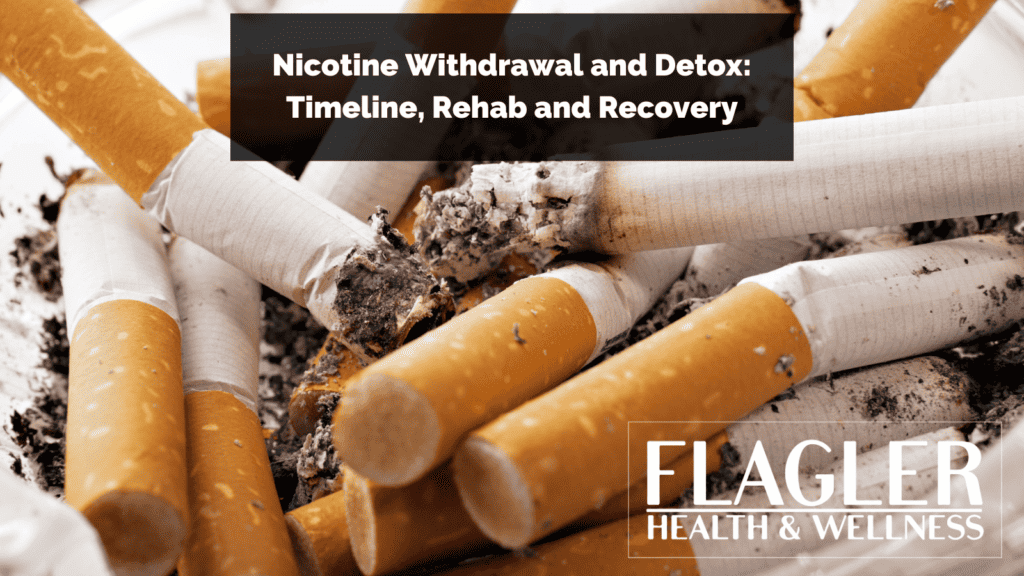Nicotine withdrawal is the physiological and psychological response that occurs when an individual quits smoking or significantly reduces their nicotine intake. It can be a challenging process for those trying to break free from nicotine addiction.
Nicotine withdrawal symptoms often include irritability, anxiety, restlessness, cravings, difficulty concentrating, increased appetite, and mood swings. These symptoms vary in intensity and duration from person to person.
The primary cause of nicotine withdrawal is the abrupt cessation of nicotine intake, which disrupts the brain’s reward system. Nicotine addiction alters brain chemistry, leading to cravings and withdrawal symptoms when nicotine is no longer supplied.
Nicotine withdrawal can have both short-term and long-term effects. In the short term, it can lead to discomfort and emotional distress, while in the long term, successfully managing withdrawal symptoms can result in improved overall health and quality of life.
Difference between Nicotine Withdrawal and Nicotine Detox?
Nicotine withdrawal refers to the symptoms experienced when nicotine consumption is discontinued, while nicotine detox involves the process of eliminating nicotine from the body while managing withdrawal symptoms. Detox is a crucial step toward overcoming nicotine addiction.
What is the Cause of Nicotine Withdrawal?
Nicotine withdrawal is primarily caused by the body and brain’s dependence on nicotine, a highly addictive substance that is found in tobacco products such as cigars and cigarettes. Nicotine stimulates the release of dopamine in the brain, creating a sense of pleasure and reward.
When nicotine is removed, the brain’s chemistry is disrupted, leading to withdrawal symptoms. It’s important to understand the underlying factors of withdrawal so that people understand that long term recovery is not simply a matter of willpower. Here is a closer look at what causes nicotine withdrawal:
- Neurochemical Changes: Over time, chronic nicotine use alters the brain’s neurochemistry. It causes the brain to adapt by becoming reliant on nicotine to maintain normal dopamine levels, leading to a state of physical and psychological dependency.
- Reward Pathway Reinforcement: The brain’s reward pathway is reinforced with continued nicotine use, making it increasingly difficult to quit. As a result, the brain becomes wired to associate smoking or nicotine consumption with pleasure and reward.
- Disruption of Brain Chemistry: When nicotine is abruptly removed from the system, the brain’s chemistry is disrupted. Without nicotine’s stimulation, dopamine levels drop. This imbalance leads to the emergence of withdrawal symptoms, as the brain struggles to regain equilibrium.
- Cravings and Symptoms: Nicotine withdrawal symptoms, such as cravings, irritability, anxiety, and mood swings, are the body’s response to the sudden absence of nicotine and the brain’s efforts to readjust its neurochemistry.
Symptoms of Nicotine Withdrawal During Detox
Nicotine withdrawal during detox can manifest with a range of physical and psychological symptoms, making it crucial to address both aspects during the quitting process. These symptoms typically peak within the first few days and gradually subside over time:
Physical Symptoms:
- Cravings
- Headaches
- Increased Appetite
- Tingling Sensations
- Sweating
- Gastrointestinal Distress
- Insomnia
Psychological Symptoms:
- Irritability
- Anxiety
- Depression
- Mood Swings
- Difficulty Concentrating
- Increased Stress
- Intense Cravings
When Does Nicotine Withdrawal Start?
Nicotine withdrawal usually begins within a few hours to a day after quitting smoking or using nicotine products. The timing and intensity of withdrawal symptoms can vary based on individual factors, including the level of nicotine dependence.
What Are the Effects of Nicotine Withdrawal (Short-Term and Long-Term)?
Short-term effects of nicotine withdrawal include discomfort and emotional challenges, while long-term effects can lead to improved respiratory health, reduced risk of chronic diseases, and an overall better quality of life.
How Long Does Nicotine Withdrawal Take During Detox?
The duration of nicotine withdrawal during detox varies from person to person. Generally, acute withdrawal symptoms peak within the first week and gradually improve over several weeks to a few months. However, some cravings and psychological triggers may persist for an extended period.
What Influences Nicotine Withdrawal and Detox Timeline?
Several factors influence the duration and severity of nicotine withdrawal, including the individual’s smoking history, nicotine intake, overall health, and the support and coping strategies used during the detox process.
What Happens During Nicotine Withdrawal?
Nicotine withdrawal is a complex process during which a person’s brain and body adjust to the absence of the drug. While it can be challenging, it is a necessary and transformative journey toward a healthier, nicotine-free life. Here are some of the adjustments that occur during withdrawal:
- Neurochemical Changes: When a person stops using nicotine, the brain undergoes significant neurochemical changes. Nicotine stimulates the release of dopamine, a neurotransmitter associated with pleasure and reward. Over time, the brain becomes dependent on nicotine to maintain these elevated dopamine levels.
- Absence of Nicotine: When nicotine is no longer introduced into the body, the brain’s reward system is disrupted. The absence of nicotine leads to a decrease in dopamine release, resulting in a range of physical and psychological withdrawal symptoms.
Factors That Affect Nicotine Withdrawal
There are several factors that can significantly influence the severity and duration of nicotine withdrawal symptoms. Understanding these factors is crucial in tailoring effective strategies for managing withdrawal. Here are some key factors to consider:
- Dependency Level: The degree of nicotine addiction plays a significant role. Individuals with a higher level of dependency may experience more intense withdrawal symptoms.
- Duration of Use: The length of time a person has been using nicotine products can impact withdrawal. Long-term users may have more ingrained habits and cravings.
- Co-occurring Mental Health Conditions: Individuals with underlying mental health issues, such as depression or anxiety, may find nicotine withdrawal symptoms more challenging to manage.
- Support System: Having a strong support network, including friends and family, can positively affect the ability to cope with withdrawal.
- Stress Levels: High-stress levels can exacerbate withdrawal symptoms. Learning stress management techniques is crucial for successful coping.
- Environmental Triggers: Identifying and avoiding environmental triggers associated with smoking or nicotine use is essential in minimizing cravings.
- Genetic Factors: Genetic predispositions may influence how individuals respond to nicotine withdrawal, affecting the severity of symptoms.
How to Treat Nicotine Withdrawal
In order to treat nicotine withdrawal effectively, it’s important to create a plan that addresses the physical, emotional, and psychological aspects of a nicotine addiction. A holistic approach that has the entire individual in mind has a better chance of long term recovery outcomes. Here are some key strategies to keep in mind:
- Therapy: Cognitive-behavioral therapy (CBT) can help people identify triggers, modify thought patterns, and develop coping strategies.
- Medication-Assisted Treatment (MAT): FDA-approved medications like nicotine replacement therapy (NRT), bupropion (Zyban), or varenicline (Chantix) can help reduce cravings and withdrawal symptoms.
- Mindfulness Practices: Learning stress-reduction techniques such as mindfulness, meditation, and yoga can help people manage stress without resorting to nicotine.
- Nutritional Counseling: Weight gain is often associated with nicotine withdrawal. Eating a balanced diet and staying hydrated can help.
- Physical Activity: Regular exercise helps boost mood, reduce stress, and improve overall well-being.
- Supportive Environment: Create a smoke-free and nicotine-free environment to minimize triggers and temptations.
- Relapse Prevention Plans: Develop strategies to identify and manage triggers and high-risk situations, helping to prevent relapses and maintain abstinence.
Can I Die From Nicotine Withdrawal?
Nicotine withdrawal itself is not life-threatening. However, quitting smoking or using nicotine products can substantially reduce the risk of developing serious health conditions associated with long-term nicotine use.
How to Cope with Nicotine Withdrawal
Coping with nicotine withdrawal usually requires multiple forms of support, which can range from professional medical advice to implementing healthy lifestyle changes. Here are some strategies to consider:
- Rehab and medically supervised detox: Consult with an addiction professional who can help you manage withdrawal symptoms safely.
- Nicotine Replacement Therapies (NRT): NRT options include nicotine patches, gum, lozenges, nasal sprays, and inhalers, which provide controlled doses of nicotine to reduce cravings and withdrawal symptoms.
- Mindfulness Practices: Techniques like deep breathing, meditation, yoga, and regular exercise can help you cope with stress without turning to nicotine.
- Building a Strong Support Network: Consider joining a support group or online community of individuals going through the same journey. Connecting with others who understand your struggles can be immensely helpful.
- Identifying Triggers: Recognize the situations, emotions, or habits that trigger your cravings for nicotine. Common triggers include stress, social situations, and specific routines.
Get Help At Flagler
At Flagler, we offer a range of treatment options to assist individuals struggling with a nicotine addiction. From the initial detox phase to ongoing therapy and support, we are committed to providing compassionate and effective care tailored to each individual’s needs.
Our treatment programs utilize a combination of modalities and support c to help you recover from addiction and build a strong foundation for the life you’d like to lead. No matter where you are on your recovery journey, there is always help available. Reach out to us today for more information about how our heroin treatment programs can help you or a loved one.
Share This Post







